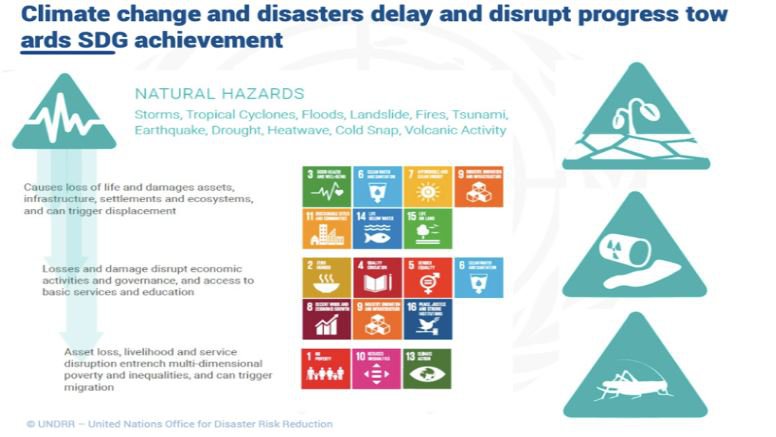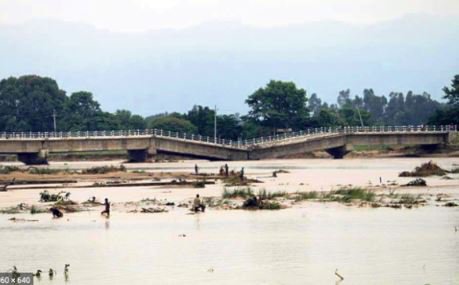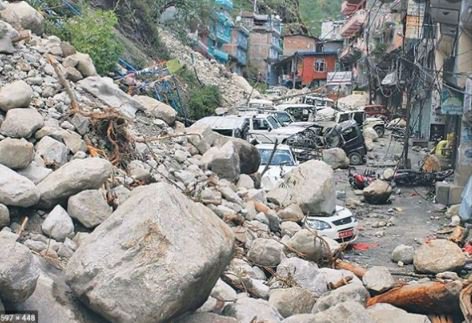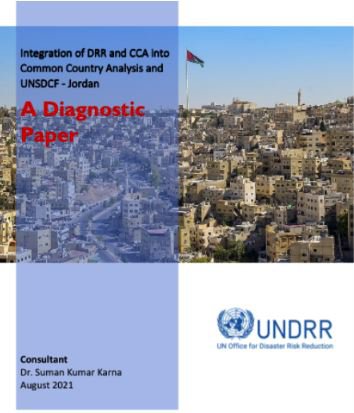Disaster and Climate Change risk constitutes a significant challenge to national development and poverty reduction. They continuously pose a threat to the achievement of the SDGs and this challenge is likely to be exacerbated as the frequency and intensity of impact, particularly triggered by the climate change risk, is rapidly growing. The selection and process of development itself can either contribute to the sustainability of the city or can undermine the sustainability aspect and contribute to climate change and disasters. With the same scale of natural hazards, different countries and cities within the country experience different impacts. This varying impact depends largely on the kind of development choices they make, the systemic vulnerabilities and adaptive capacity of the city. Reducing disaster risk and building resilience are core aspects of the 2030 Agenda for Sustainable Development. It is evident that increasing disaster risk presents an immense challenge to the success of the outcome, particularly the SDGs and target actions, but at the same time the application of disaster risk reduction measures and building resilience offers a strategic opportunity to ensure its success. Unless disaster risks are effectively managed, increasing disaster loss and impacts will continue to undermine efforts to reduce poverty and achieve sustainable development.

Building the resilience of communities and nations is fundamental to achieving the goals and succeeding in attaining development that is sustainable. The recent trend of disaster losses is on an exponential rise, while the projected increase over the coming decades and the likely impact on development efforts is even more alarming. This situation presents a strong case for the inclusion of disaster risk and resilience in the 2030 Agenda for Sustainable Development. The solution to this challenge is to make a sustained effort towards integrating DRR and climate change interventions into broader development approaches. A more profound synergies in implementing three major global frameworks dedicated to Sustainable Development (SD), Disaster Risk Reduction (DRR) and Climate Change Adaptation (CCA) is indispensable, which can be achieved via programmatic integration, collaboration, capacity building, and innovation. The inter-linkage between SD, DRR and CCA is apparent and therefore, a more coordinated and collaborated response is pre-requisite to make development endeavors sustainable.
The 2030 Agenda makes a significant commitment to integrate disaster and climate risk into all levels of development. This shows that development can be affected by risks, but also that development creates its own risks. As countries work towards the SDGs, two specific needs arise: to understand how we do risk-informed development and apply in all our decisions and planning. For risk-informed development, we need precise information on the various risks which development planners and decision makers can account for in planning, budgeting, policymaking, and project implementation. Risk reduction is an integral part of the development process and not as an external ‘add-on’, but also to design a development paradigm that addresses both ‘risks to’ and ‘risks from’ development. Understanding that development can cause risks is integral to risk-informed development. Implementation of all the post-2015 development agreements needs to mainstream measures to reduce disaster risk and loss and build resilience to preserve present and future development gains.

Both the Sendai Framework and Paris Declaration have an important role in the implementation and achievement of the 2030 Agenda for Sustainable Development and vice versa. Both have the capacity to shape public and private sector efforts and build partnerships to address the underlying drivers of risk and future levels of risk and resilience if implementation is concerted. Further, implementing SDGs provides an opportunity to inform the development visions about risk, following agendas like improved risk governance, mainstreaming DRR and CCA and accelerated policy support initiatives. Experience has shown that incorporating risk information into the development agenda will help reduce vulnerabilities, connect immediate, medium and long-term development needs, while ensuring sustainability of development investments and resilient livelihoods. This is relevant not only for achieving the Sendai Framework Outcome aimed at ‘substantial reduction of disaster risk and losses’ but will also advance the resilient and sustainable development vision of the 2030 Agenda. The Sendai Framework outlines seven global targets to be achieved over the next 15 years: a substantial reduction in global disaster mortality; a substantial reduction in numbers of affected people; a reduction in economic losses in relation to global GDP; substantial reduction in disaster damage to critical infrastructure and disruption of basic services, including health and education facilities; an increase in the number of countries with national and local DRR strategies by 2020; enhanced international cooperation; and increased access to multi-hazard early warning systems and disaster risk information and assessments.

Learning from the above discussions, it is important that the nexus between DRR and development should be sufficiently explored and prioritized in our both national and local contexts. The marriage between risk reduction and development prospect is indispensable if we are serious about securing our progress to sustainable goals. The agenda must be championed and advanced with immediate effect through collaboration and partnership among the relevant partners and stakeholders of this field. The relevant institutions and, more importantly, DRR professionals and must come forward and move their steps in alliance with development vision and practitioners active on the ground. The developing country like Nepal, which is significantly constrained by limited resources, cannot afford to lose its development gains at the cost of disaster affects. This agenda is more prevalent and urgent as our country is highly prone to multiple hazards and disaster losses are at markedly high.

In order to advance this agenda in Arab region, UN-DRR Cairo Office has recently developed five separate Diagnostic Paper for five Arab countries with an aim to facilitate the revision and completion process of Common Country Analysis (CCA) which will further lead to development of UNSDCF, by providing a good overview of Disaster Risk Reduction and Management (DRRM) and Climate Change Adaptation situation including challenges and solutions in the selected country. The content of this paper is a good mix of both facts and figures and practical perspective of linkages and influences in the field. The Diagnostic Paper is comprehensive and robust whereby, it has described all major components of DRRM and Climate Change Adaptation, particularly in the context of understanding their impact on different Sustainable Development Goals 2030. The Diagnostic Paper has adopted a truly integrated approach to deal with and understand climate and disaster risk and their direct and indirect influences on sustainable development prospects of the country. The data and information provided around different components are expected to lead a more extensive and insightful assessment under the Common Country Analysis exercise. The paper has highlighted the country’s key priorities, including fundamental norms and principles and some apparent gaps and potential solutions in areas of climate and disaster risk reduction and management sector. The discussion paid extra attention towards integrating poor and marginalized communities and therefore making DRR smart and inclusive and development resilient. Few significant progresses are categorically captured,
While the process to build on them is further explored and presented.
Dr. Karna is an Urban Governance and DRR Specialist having more than 15 years of professional experience in this field. He is presently working as a freelance consultant for multiple agencies like UN, IFRC, USAID, DCA, OXFAM, Merci Corp and others. He is available at - sumankarna@hotmail.com
- The NDRRMA's Role In Building Disaster Resilience: Why Leadership Matters
- Mar 07, 2025
- Missing On Early Warning – Pushed To Rising Death-Tolls And Losses Of Properties And Infrastructures
- Oct 07, 2024
- Building Climate Resilient Infrastructures - Way To Minimize Disasters Induced Damages And Losses
- Jun 21, 2023
- An Overview Of Early Warning System (EWS) In Nepal- How Inclusive And Resilient To Communities At Risk
- Oct 14, 2022
- Urban Resilience- A Growing Concern Of Urbanizing Nepal
- Aug 13, 2020













